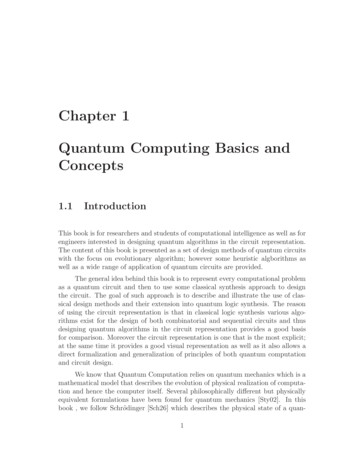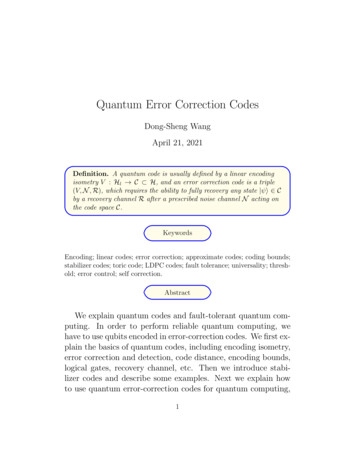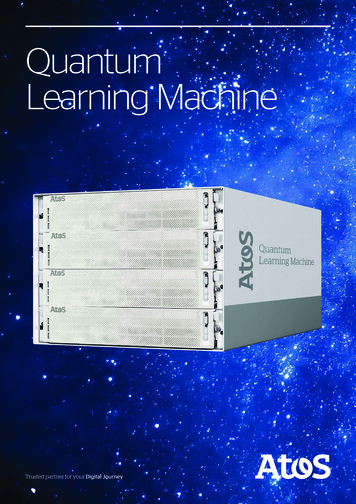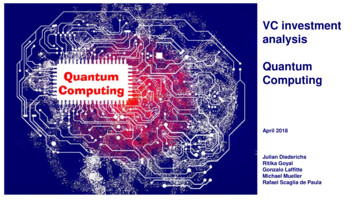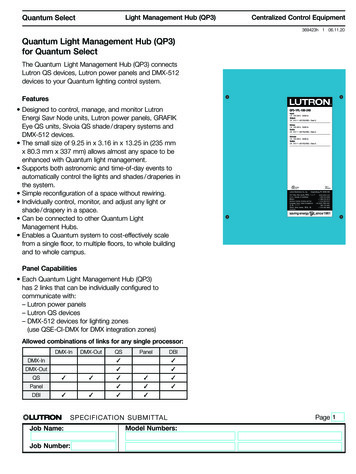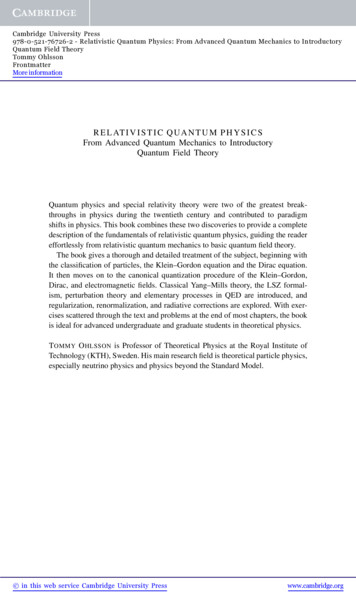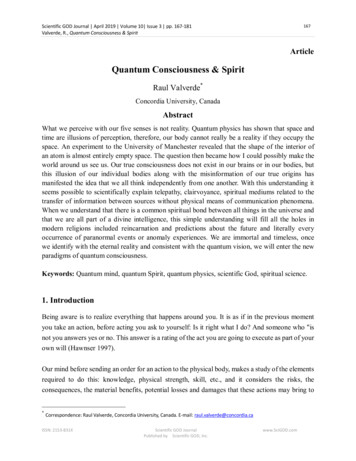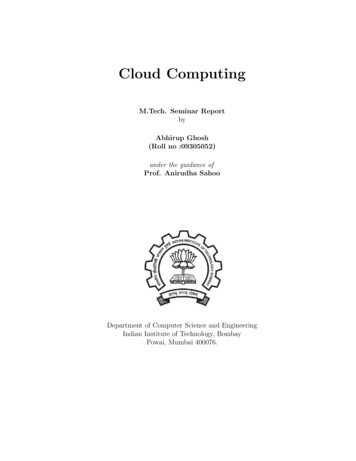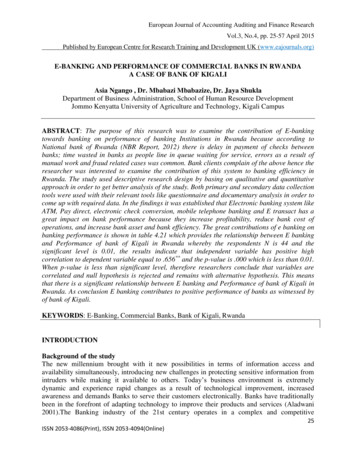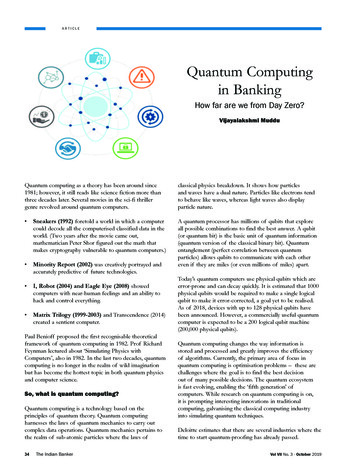
Transcription
ARTICLEQuantum Computingin BankingHow far are we from Day Zero?Vijayalakshmi MudduQuantum computing as a theory has been around since1981; however, it still reads like science fiction more thanthree decades later. Several movies in the sci-fi thrillergenre revolved around quantum computers.classical physics breakdown. It shows how particlesand waves have a dual nature. Particles like electrons tendto behave like waves, whereas light waves also displayparticle nature. Sneakers (1992) foretold a world in which a computercould decode all the computerised classified data in theworld. (Two years after the movie came out,mathematician Peter Shor figured out the math thatmakes cryptography vulnerable to quantum computers.) Minority Report (2002) was creatively portrayed andaccurately predictive of future technologies.A quantum processor has millions of qubits that exploreall possible combinations to find the best answer. A qubit(or quantum bit) is the basic unit of quantum information(quantum version of the classical binary bit). Quantumentanglement (perfect correlation between quantumparticles) allows qubits to communicate with each othereven if they are miles (or even millions of miles) apart. I, Robot (2004) and Eagle Eye (2008) showedcomputers with near-human feelings and an ability tohack and control everything. Matrix Trilogy (1999-2003) and Transcendence (2014)created a sentient computer.Paul Benioff proposed the first recognisable theoreticalframework of quantum computing in 1982. Prof RichardFeynman lectured about ‘Simulating Physics withComputers’, also in 1982. In the last two decades, quantumcomputing is no longer in the realm of wild imaginationbut has become the hottest topic in both quantum physicsand computer science.So, what is quantum computing?Quantum computing is a technology based on theprinciples of quantum theory. Quantum computingharnesses the laws of quantum mechanics to carry outcomplex data operations. Quantum mechanics pertains tothe realm of sub-atomic particles where the laws of34The Indian BankerToday’s quantum computers use physical qubits which areerror-prone and can decay quickly. It is estimated that 1000physical qubits would be required to make a single logicalqubit to make it error-corrected, a goal yet to be realised.As of 2018, devices with up to 128 physical qubits havebeen announced. However, a commercially useful quantumcomputer is expected to be a 200 logical qubit machine(200,000 physical qubits).Quantum computing changes the way information isstored and processed and greatly improves the efficiencyof algorithms. Currently, the primary area of focus inquantum computing is optimisation problems – these arechallenges where the goal is to find the best decisionout of many possible decisions. The quantum ecosystemis fast evolving, enabling the ‘fifth generation’ ofcomputers. While research on quantum computing is on,it is prompting interesting innovations in traditionalcomputing, galvanising the classical computing industryinto simulating quantum techniques.Deloitte estimates that there are several industries where thetime to start quantum-proofing has already passed.Vol VII No. 3 - October 2019
ARTICLEOrganisations in the automotive, military and defence,power and utilities, healthcare, and financial services sectorsare today deploying long-lived systems that are notquantum-safe, exposing them to significant liability andfinancial overhead in the future. Quantum computingresearchers have discovered improved ways of solvingproblems using conventional computers. Some researchersare seeking to bring ‘quantum thinking’ to classicalproblems, according to Natalie Wolchover, a sciencejournalist for Qanta magazine.Classical computers vs Quantum computers Classical computing involves binary values of 0 and 1;quantum computing also reads using 0 and 1, but it canhold much more complex information includingnegative values.‘A Classical computation is like a solo voice – one line of pure tonessucceeding each other. Quantum computation is like a symphony –many lines of tones interfering with one another,’ says Seth Lloyd,an MIT Professor.Quantum computing and the rest of the worldLarge companies like Intel, Google, Lockheed Martin etc,are collaborating with universities to foster research. IBMhas announced a series of partnerships with corporationsand academic institutions to explore the practical aspects ofthis technology. Massachusetts Institute of Technology,Princeton University and the University of Waterloo are allworking on quantum computer prototypes.Many countries, including China, are investing heavily inresearch and development into quantum computing.Even governments around the world (USA, Australia,European Commission) are forging ahead with quantumcomputing initiatives.Classical computing processes bits sequentially; inquantum computing, qubits are entangled such thataltering the state of one qubit alters all other qubits,allowing quantum computers to converge on the rightanswer very quickly. Due to this property calledsuperposition, quantum computers can do anextraordinary amount of calculations simultaneously.Satya Nadella, CEO of Microsoft, articulated thatQuantum Computing, Mixed Reality and ArtificialIntelligence (AI) would be the three path-breakingtechnologies to shape the world in the coming years.Classical computing specifically defines the desiredoutcomes, limiting the design of the algorithm;quantum computing enables simultaneous computationsleading to several probabilistic outcomes, whichincreases confidence in the best answer.Microsoft today runs several labs around the world thatspecialise in the fabrication of quantum devices. ‘AtMicrosoft, we’re on the cusp of empowering a quantum revolutionwith our unique, topological approach,’ Nadella says, hoping that‘quantum computing will make AI even more intelligent.’(Source: MIT, Qubit Counter. *Rigetti quantum computer expected by late 2019)Vol VII No. 3 - October 2019The Indian Banker35
ARTICLEQuantum computing for financial servicesQuantum computing is gaining the interest of the financialservices industry which is looking to increase manifold, thespeed of trades, transactions and data processing.One of the biggest potential uses of quantum computing issimulation. Quantum computing helps identify a better wayto manage risk in financial portfolios. The processing timeand cost for high-quality solutions can increaseexponentially if a classical computer is used whereas aquantum computer can do it speedily with increasedoptimisation capabilities, driving new cost savings andopportunities for revenue generation.The potential benefits of quantum computing forfinancial services could be: Solving increasing problems in critical areas likecybersecurity to safeguard customer financial data usingnext-gen cryptography; financial data encoded withquantum cryptography is far more secure than currentlevels of digital security.Detection of fraudulent activities by recognisingpatterns of behaviour much faster, leading to proactivefraud risk management. Optimising Portfolio management for assets withinterdependencies. Predictive analytics in customer behaviour bycombining quantum computing with AI. A combination of quantum computing and blockchaintechnology could be the most hack-proof technology inthe Internet of Things (IoT) era. Automated decisions using sets of pre-programmedrules like seamless approval of loans and mortgages. Significantly increase transaction speed and reduceprocessing costs Downtime on infrastructure using quantum computingwould be non-existent.prescriptive response. J P Morgan Chase and Barclays Bankhave been giving serious consideration to quantumcomputing and have begun experimentation in 2017. JPMorgan entered into a partnership with IBM to explore theuse of this technology in financial services with directaccess to cloud-based IBM Q systems to performcorporate experiments. The current areas of interest forJP Morgan Chase are trading strategies, portfoliooptimisation, asset pricing and risk analysis, by leveragingon quantum computing, which requires the use of complexalgorithmic models.Japanese banks MUFG and Mizuho have tied up with IBMQ Hub at Keio University to experiment with futureapplications for quantum computing in the financial sector.Japan’s Nomura has launched a joint research project onusing quantum computing in asset management withTohoku University in Sendai.CBA has joined telco firm Telstra, the FederalGovernment, the New South Wales Government andthe University of New South Wales (UNSW) in an 83million venture to found Australia’s first quantumcomputing company.Retail bank NatWest has partnered with Fujitsu on a proofof-concept project that aims to optimise its mix of highquality liquid assets, including bonds, cash and governmentsecurities. NatWest’s quantum technology team hascompleted highly complex calculations on the bank’s 120bn-value High-Quality Liquid Assets portfolio at 300times the speed of conventional cloud-based computeresources, and with a higher degree of accuracy, saysNatWest’s director of innovation Kevin Hanley.Expert insights from an IBM Report ‘Getting Your FinancialInstitution ready for the Quantum Computing Revolution’ opinethat FIs are exploring quantum computing, both todramatically speed up immensely complicated calculationsand to improve their accuracy. Engaging now is important,as use cases are being identified, and proprietaryecosystems are being formed.Customer Relationship Management will improve from theautomation of targeted services. Customer purchasingpreferences based on demographic data can be predictedwith greater accuracy using quantum computing.The 28 largest banks worldwide manage more than USD54 trillion combined. The US stock and bond marketsalone are capitalised at more than USD 70 trillion. Inmarkets these large, creating new algorithms to optimiseportfolios, price derivatives, analyse risk, or calculate moreaccurate default probabilities, can have a massive andwidespread impact on the long-term success of global FIsand their customers.However, customer personal information needs to beprotected more effectively through simultaneousautomation and analytics by proactive anticipation andAlthough fully fault-tolerant universal quantum computersare years away, it is essential that organisations engage nowas important and promising use cases are being identified,36The Indian BankerVol VII No. 3 - October 2019
ARTICLEtools and algorithms are in development, and proprietaryecosystems are being formed. Such efforts will coalesceover time, providing first movers with quantum advantage.New risks from quantum computingQuantum computing is a giant leap forward in computingpower, theoretically. However, it is used in businessapplications is still in an exploratory stage. ‘Commercialisingthe technology is a complex task in part because qubits cannot yetmaintain their quantum mechanical state for very long and they aredelicate and easily disrupted by changes in temperature, noise andfrequency’ - The Wall Street Journal.It is also widely believed that when bad actors get access toquantum computers, they’ll use them to crack existingencryption algorithms.According to Deloitte, ‘One frightening aspect of QCdevelopment is the certainty—not merely the potential—that QCswill be used to crack previously undecipherable codes and breachearlier un-hackable systems.’Lack of quantum-safe public key encryption could result ina systemic failure of the current banking and financialsector approach to information security while exposinglarge volumes of high-value data to be breached. TheGlobal Banking and Finance Journal argues that thesignificance of the problem for the financial sector cannotbe overestimated. Today, fraud linked to online banking aswell as e-commerce transaction is an ever-growing issue inthe classical computing world.In the future, quantum computers, with their ability tobreak current public-key cryptography, may push onlinefraud from what is currently a manageable problem tosubjecting the financial sector to systemic breach scenarios.It goes on to argue further that recent fintech innovationsare also at risk. Many blockchain-based technologies rely onthe Elliptic Curve Digital Signature Algorithm (ECDSA):an algorithm that is not currently ‘quantum-safe’. Thisplaces the burgeoning cryptocurrency markets at risk, asquantum computers will probably break the underlyingcryptography at the core of these technologies, leading tocyber bank robberies of a previously unseen magnitude.Elisabetta Zaccaria, a cybersecurity expert, recommendsthat ‘One method of developing quantum-safe public-keycryptography is the deployment of a new set of public-keycryptosystems for classic computers capable of resistingquantum computer attack.These cryptosystems are called ‘quantum-safe’ or ‘postquantum cryptography’. The principle behind them is theuse of mathematical problems of complexity beyondGUIDELINES FOR AUTHORSArticles should be submitted using only Arial font in MS Word. Text of the article should be in font size 12, withheadings in font size 14 in bold. Subheadings should be made italic and bold in font size 12.Authors sending their articles for publication in ‘The Indian Banker’ should submit a certificate in the following formatalong with the material for publication. They should also send their brief biodata, scanned photo and email address.Articles should be invariably between 2400 and 6000 words.The editorial committee has decided to consider only those articles which are following the above standard and areaccompanied by the prescribed certificate.The Editor‘The Indian Banker’I/We hereby declare that the article titled submitted by me/us is the original article tothe best of my/our knowledge. I/we also declare that this article has neither been published elsewhere nor has it beensubmitted to any other publication, and that I/we have not reproduced material from any published source except aspermitted by the Copyright Act.I/We undertake to indemnify IBA against any action for any violation of Copyright Act resulting from publication ofthis article in ‘The Indian Banker’.Signature(s)Name(s)Vol VII No. 3 - October 2019The Indian Banker37
ARTICLEyears, the Indian Space Research Organisation (ISRO),Defence Research and Development Organisation(DRDO), and Department of Atomic Energy (DAE)are expected to jointly pool in a sum of INR 300 croresto push QuEST to Phase 2 that would ensure thatIndia's quantum computing programme matchesinternational standards.(Photo Credit: Pixabay)Quo Vadisquantum computing’s ability to solve them. Theinformation security industry currently recognises fivetypes of cryptosystems as promising replacementcandidates for current cryptography. These are hash-based,code-based, lattice-based, multivariate-based and supersingular isogeny-based.Quantum computing is real, even if it is in its infancy. It iswidely believed that quantum computing will solve theincreased computing needs of financial firms using far lessenergy than traditional computers.International standards bodies, including the NationalInstitute of Standards and Technology (NIST) USA, arecurrently in the process of conducting more analysis andresearch before they can go forward on determining whichof these to adopt.Quantum computing and IndiaIn the global race to build quantum computers, India hasso far been present only in theory compared to the US,China and the handful of other European countries thatwere spending large amounts of money. India has severaltheorists, but only a few have been trying to build aquantum computing device.Department of Science and Technology (DST), IndianInstitute of Science (IISc), Tata Institute of FundamentalResearch (TIFR) and Indian Institute of Science, Educationand Research (IISER) are currently engaged in quantumcomputing research.In 2018, Microsoft India launched the Microsoft Garage –an experimentation resource for its employees, toencourage problem-solving in new and innovative ways.Microsoft Garage is collaborating with Indian engineeringstudents by leveraging on its strength in quantumprogramming and algorithms, to grow the worldwide tribeof scientists, experimentalists and programmers working onquantum computing.The DST has set up a programme called QuantumEnabled Science & Technology (QuEST). As a part of theprogramme, it will invest a sum of INR 80 crore in a spanof three years to facilitate research in this field. DuringJanuary 2019, a road-map that would help in laying thegroundwork for building quantum computers in India wasdiscussed in the first meeting of QuEST connoting Phase Iof India’s quantum computing programme. After three38The Indian BankerAccording to an IBM report, Quantum computing isnearing a phase of commercialisation that may change ourworld. Visionary organisations are already aligning with theemerging quantum computing ecosystem to become‘quantum ready’ – exploring use cases and associatedalgorithms that address complex problems and help enablenew business models. Quantum supremacy is not thereyet as quantum-ready algorithms may take a few more yearsto arrive.To sum up in the words of Lee Braine, the ChiefTechnology Officer of Barclays, ‘Combined with ArtificialIntelligence, quantum computing will be the most disruptive technologysince the invention of the wheel. Those who do not embrace this newparadigm today will be left behind.’About the AuthorVijayalakshmi Muddu is currently workingas DGM and Senior Faculty at the StateBank Institute for Consumer Banking. Priorto this, she was deputed as CEO, Chicagoand Vice President & Head (Syndications)at US Operations, New York.She holds a Master’s in Economics andwas awarded a Gold Medal in Public Administration forBachelor’s in Arts. She also holds additional certifications likeDiploma in Business Finance, Marketing, Management,International Banking, Trade Finance etc.She had joined as a Probationary Officer in State Bank ofIndia in 1990. Her experience spans nearly three decades inCredit, Retail, Forex and International Banking includingassignments of Relationship Manager, Team Leader, ForexDealer, Head of IB Division and Branch Management.An avid reader, enjoys writing, classical music and movies,gardening, painting and is an enthusiastic homemaker.She can be reached at srfaculty2.sbicb@sbi.co.inVol VII No. 3 - October 2019
Classical computing involves binary values of 0 and 1; quantum computing also reads using 0 and 1, but it can hold much more complex information including negative values. Classical computing processes bits sequentially; in quantum computing, qubits are entangled such that altering the state of one qubit alters all other qubits,

